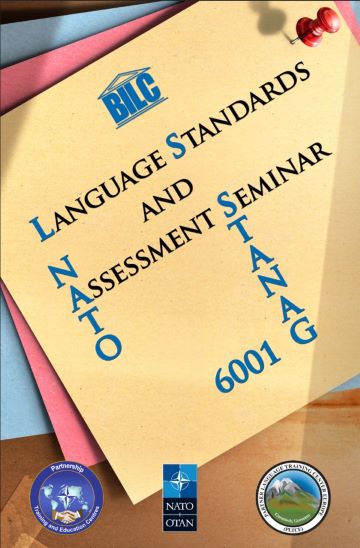
Language Standards and Assessment Seminar
The Language Standards and Assessment Seminar (LSAS) is a NATO approved course and addresses the following NATO training requirements:
- Ensure language training programs are aligned to NATO standards
- Evaluate language program outcomes IAW STANAG 6001
- Develop language assessment and validation tools IAW STANAG 6001
- Advise PTECs and COEs on language-related issues upon request
The LSAS is listed in e-Prime under ACT.648 (https://e-prime.org)
The LSAS is listed in eTOC under ETE-LA-35453 (https://e-itep.act.nato.int/Guest/ETOCindex.aspx)
Course Description The Language Standards and Assessment Seminar is an interactive seminar that familiarizes participants with the NATO standards for language proficiency and introduces them to sound principles of testing in order to foster student-centered learning, more accurate assessments of student progress and improved instructional program design. Seminar activities include lectures, small group projects, plenary discussion, hands-on practice in developing and reviewing assessments, and analysis of case studies on language instruction and assessment.

Aim The aim of the Language Standards and Assessment Seminar is to familiarize teachers and program managers with the STANAG 6001, Language Proficiency Levels for the skills of listening, speaking, reading and writing, to provide guidelines for aligning language instruction to the NATO standards, to foster assessment literacy, including knowledge of sound testing principles and basic concepts of statistical analysis, and to enable teachers and managers to develop and administer valid and reliable classroom assessments.
Training Strategy Facilitator-led plenary sessions and small group work. Daily homework assignments.
Final Learning Outcomes
Participants will
- apply their knowledge of the STANAG 6001 language proficiency levels in ensuring that their classroom instruction and assessment is aligned to NATO standards
- follow sound testing principles when developing classroom based assessments
Learning Objectives
Participants will
- identify the Content, Tasks, and Accuracy statements in the STANAG 6001 descriptors for listening, speaking, reading and writing, Levels 1-3
- determine the proficiency levels of language samples or test items in the skills of listening, speaking, reading and writing IAW NATO STANAG 6001 descriptors, Levels 1-3
- match test type with testing purpose or instructional aim
- describe best practices in the test development process and the administration of tests
- identify appropriate techniques for testing each of the skills of listening, speaking, reading and writing, explaining the advantages and disadvantages of item formats
- participate in an item moderation session and make recommendations for improving faulty test items
- explain the effect of the testing principles of validity, reliability, practicality, and authenticity on the development and administration of assessments
- perform a simple statistical analysis of a test data set
- produce test specifications and draft a partial classroom assessment
- identify examples of positive and negative washback and their impact on classroom instruction
- describe factors essential to building language proficiency in a language training program and for aligning instruction to NATO standards
- analyze case studies of language training programs, explaining their strengths and weaknesses, and make recommendations for program improvement and a valid assessment plan
Duration: 8 days
Eligibility Military or civilian language teaching faculty and language program managers in military language schools. SLP 2/2/2/2 or higher
Email: BILC [at] marshallcenter.org
Course Details
Artillery Kaserne
Breitenauer Strasse 16
Gebaude 253
Garmisch-Partenkirchen 82467, Germany
12 weeks before the start of each course, invitations are issued to national BILC Points of Contact. Applications from qualified candidates are due no later than six weeks before the course starts; actual deadlines are stated in each invitation. Partner nations using e-Prime or with SHAPE Partnership funded seats must still apply in accordance with invitation instructions and within the prescribed time frame.